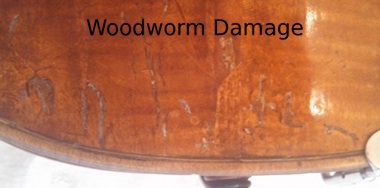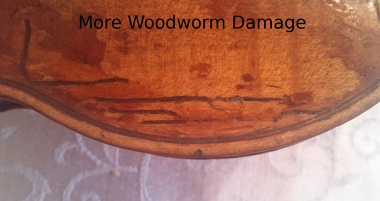Master Hand Violin Shop
Store Hours
Owner
Elizabeth Ecklund
Elizabeth Ecklund
You probably thought the gross stories were over after the blog on bow bugs. Boy were you wrong! Because equally disgusting as bow bugs, significantly more damaging than bow bugs, and possibly way more important than bow bugs, is the woodworm. Not to worry; I don't have any photos of a woodworm on hand to gross you out. Unlike bow bugs, it's rare to actually see a woodworm, and even then, you often need to take the violin apart. Occasionally you might hear the woodworm, but usually, you just see the results...
So what is a woodworm? It's the larva of a wood boring beetle. Just like bow bugs, the woodworm is a grubby little pest that hangs out in your case and snacks. However, while the the bow bug may cause you to need a bow rehair after going to town, the woodworm can destroy your instrument. The woodworm chews into and along the grain of the wood of your violin or cello and munches on wood (which you might be able to hear) until it finally exits through the hole it chewed and becomes an adult. A female beetle may leave behind eggs, which can lay dormant for quite a while and eventually turn into more worms. This is bad.

So what do you do if you suspect you have woodworms? First things first; don't panic. Unless you have a Gammacell irradiator at your disposal, there's very little that you can do besides calling us (or your local professional). Even if you do have a Gammacell to kill all the eggs and worms, you'll still need to call to ensure that there is not damage that needs repairing or too much damage to have your instrument repaired. If you bring your instrument in to Master Hand, we can assess the damage, kill any remaining worms, fill worm holes, and repair any repairable damage that may have occurred. You should not try this at home.
Not to worry, there is something that you can do at home: woodworm prevention! How do you prevent woodworms? You practice your instrument! It doesn't matter how good you are; what woodworms don't like is the vibration of your instrument! Of course, we're not totally sure that playing poorly wouldn't further encourage them to leave. Additionally, you should turn down your humidity and turn up the heat! Woodworms like cool environments and humidities in excess of 65%. Decreasing humidity may sound like slightly odd advice, since we recently discussed the importance of ensuring your violin is properly humidified at ~40%, so basically just make sure your violin is stored in your comfortable house, rather than some forgotten attic.

There are chemical treatments that can be used on violins to prevent worms. And in fact, it turns out that some people think this might be the secret that Stradivarius himself didn't even know he had! You see, Cremona was having a terrible wood infestation at the time of Stradivarius, so Stradivarius seems to have treated his violins with borax to prevent worms. It turns out that borax changes the chemical bonds in the wood in a way that it greatly improves the sound produced by the the instrument**.
So could it be that woodworms might not be all bad? Absolutely not! For you, the reader, woodworms are always bad, and you should do everything you can to prevent them. Think of the Strad story as merely a silver lining that won't affect you personally. Now, go home and practice!
**And finally, lest we infringe on copyrights, you can read the Stradivarius and borax paper for yourself.
Share on Facebook